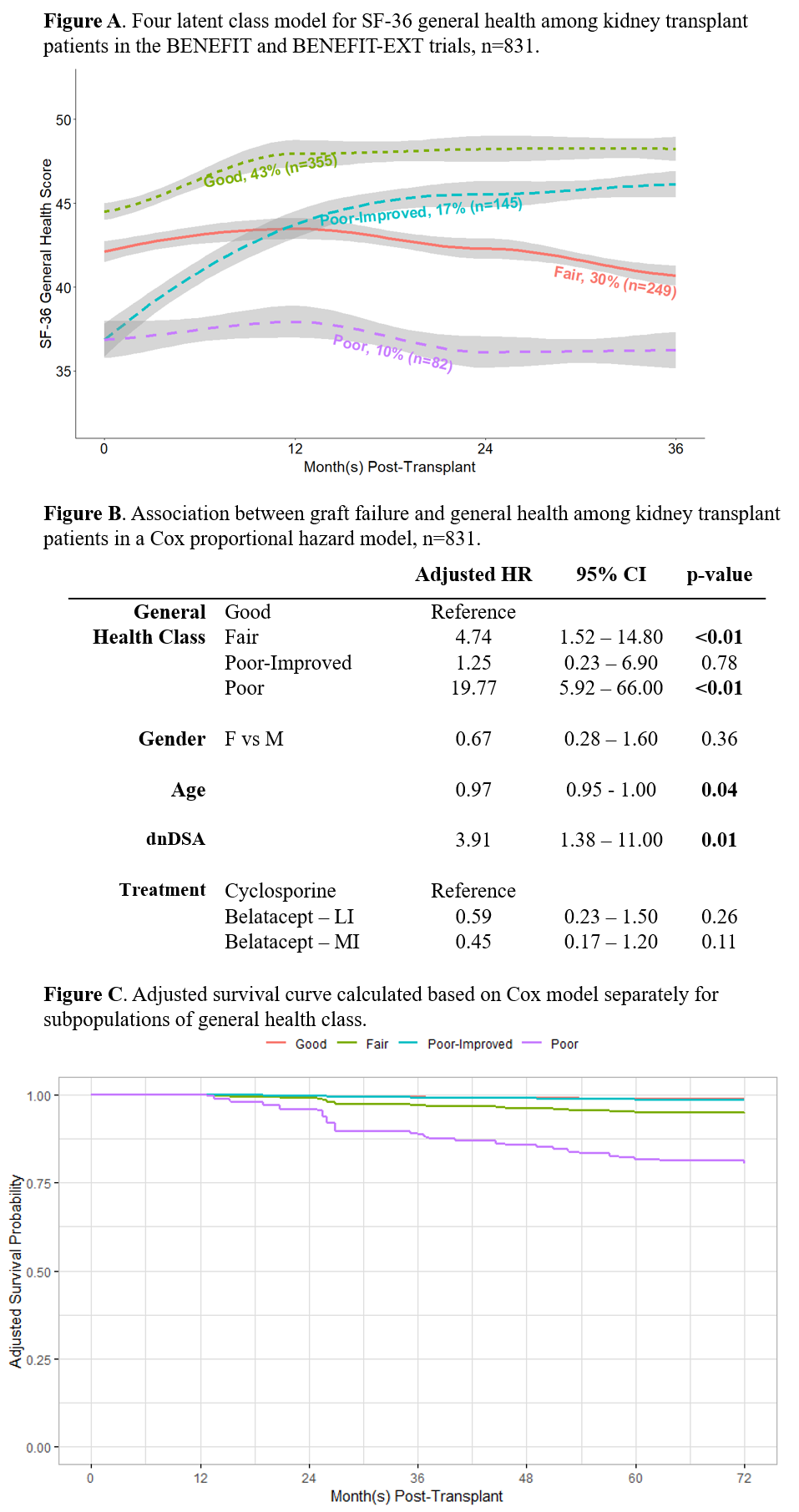Assessment of Health-Related Quality of Life and Graft Failure among Kidney Transplant Patients in the Benefit and Benefit-EXT Trials
I. Purnajo1, J. L. Beaumont1, M. Polinsky2, E. Alemao2, M. J. Everly1
1Terasaki Research Institute, Los Angeles, CA, 2Bristol Myers Squibb, Princeton, NJ
Meeting: 2019 American Transplant Congress
Abstract number: C103
Keywords: Outcome, Quality of life, Risk factors
Session Information
Session Name: Poster Session C: Kidney Psychosocial
Session Type: Poster Session
Date: Monday, June 3, 2019
Session Time: 6:00pm-7:00pm
 Presentation Time: 6:00pm-7:00pm
Presentation Time: 6:00pm-7:00pm
Location: Hall C & D
*Purpose: To achieve patient focused drug development in renal transplant, we need to better understand how the patient’s perspective of health-related quality of life (HRQoL) correlates to graft loss. Herein, we analyzed the BENEFIT and BENEFIT-EXT (cyclosporine versus belatacept) cohorts, to determine the HRQoL longitudinal trajectories that were associated with graft failure.
*Methods: In the trials, SF-36 (HRQoL) was assessed at baseline, 12, 24, and 36 months post-transplant. Latent class mixed effect modeling (for each SF-36 subscale) was used to determine the HRQoL longitudinal trajectories. Through an extended Cox model, each subscale of SF-36 was entered as a time-varying covariate in separate models to determine each subscale’s association with graft failure (p<0.05). Our analysis excluded enrolled patients who had graft failure within <1 year or were taken off the randomized drug (belatacept or cyclosporine) use within <1 year, resulting in 831 eligible patients.
*Results: Latent class analysis revealed four distinct patient classes of general health subscale: good, fair, poor, and poor-improved (Figure A). The 4 general health latent classes were entered into a graft loss risk model controlling for other patient characteristics (Figure B, C). The risk of graft loss is 4.74 times (95% CI: 1.52 – 14.80, p<0.01) higher among those with fair health compared to those with good health, and 19.77 times (95% CI 5.92 - 66.00, p<0.01) higher among those with poor health compared to those with good health.
*Conclusions: Patient-reported quality of life over time is closely associated with graft survival outcomes following kidney transplantation and should not be ignored. Further analysis to examine symptoms associated with general health can provide a deeper understanding of the drivers of general health, improve patient satisfaction, and reduce the risk of graft failure among those with less than satisfactory health.
To cite this abstract in AMA style:
Purnajo I, Beaumont JL, Polinsky M, Alemao E, Everly MJ. Assessment of Health-Related Quality of Life and Graft Failure among Kidney Transplant Patients in the Benefit and Benefit-EXT Trials [abstract]. Am J Transplant. 2019; 19 (suppl 3). https://atcmeetingabstracts.com/abstract/assessment-of-health-related-quality-of-life-and-graft-failure-among-kidney-transplant-patients-in-the-benefit-and-benefit-ext-trials/. Accessed February 26, 2026.« Back to 2019 American Transplant Congress

